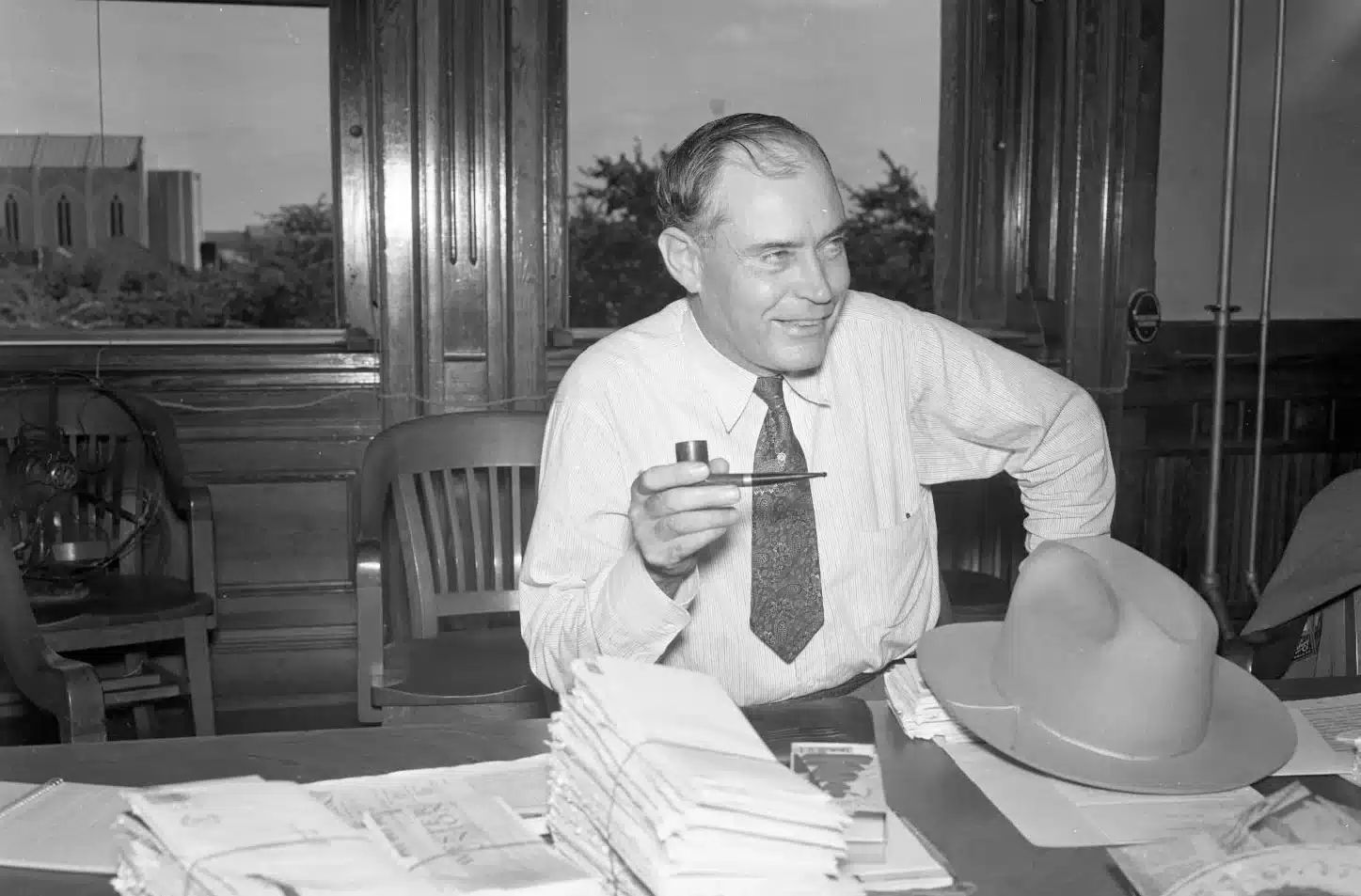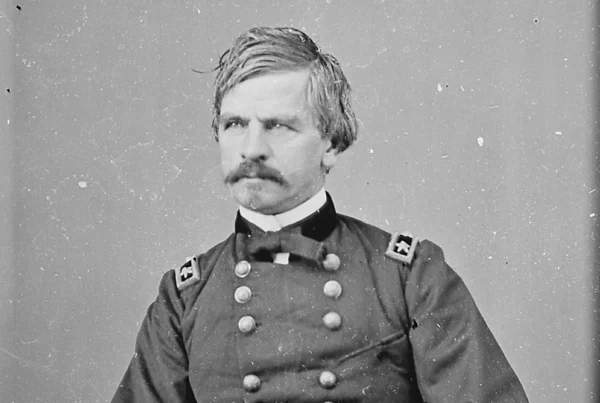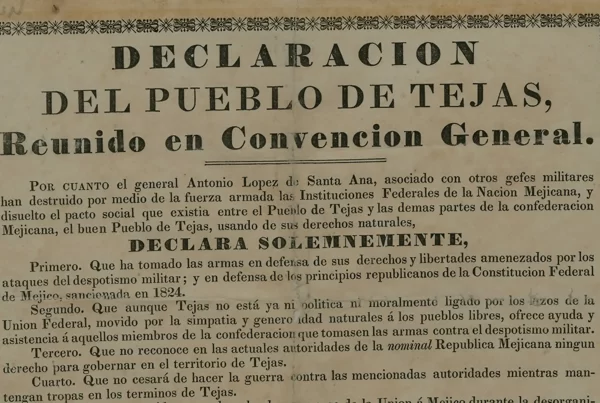This article is part of Texapedia’s curated primary source collection, which makes accessible both famous and forgotten historical records. Each source is presented with historical context and manuscript information. This collection is freely available for classroom use, research, and general public interest.
Coke R. Stevenson delivered his second inaugural address on January 21, 1945, following his decisive reelection to a full term as governor of Texas. Though not a landmark speech in Texas political history, the address is notable for its wartime context and articulation of Stevenson’s political philosophy and views on American polity.
A fiscal conservative grounded in rural sensibilities, Stevenson nevertheless affirmed the purpose of government as serving the public good, saying, “Government is the result of the desire of individuals for an authority which will serve the whole of society. Its origin is of great antiquity.” At the same time, he drew sharp boundaries around government’s role in private life: “This government [of the United States] recognized that a man’s home is his castle.”
The address offers insight into how Texan politicians of the 1940s navigated the growing tension between federal expansion and state autonomy during a global war. Notably absent are sweeping proposals or emotional appeals; Stevenson’s rhetoric instead focuses on the larger philosophical questions at stake in the ongoing World War between totalitarian powers — Germany and Japan — and the United States and its allies.
This document is best read alongside Texapedia’s biography of Governor Stevenson and within the broader context of political thought in Texas. It is also part of a developing archive of primary sources, which together trace the evolution of government and political ideology in Texas across the twentieth century.
Second Inaugural Address of Governor Coke R. Stevenson
Delivered to the Joint Session of the Texas Legislature
January 16, 1945
Mr. President of the Senate, Mr. Speaker of the House, Members of the Legislature in Joint Session, Ladies and Gentlemen:
I deeply appreciate the introduction by my long-time personal friend Claud Gilmer [Speaker of the House]. If it reflects a bias in my favor, it is the result of that type of affection found in the Hill Country where the faith of men in each other is founded upon the strongest ties of confidence and performance.
It is that type of affection between persons which ought to prevail between individuals and their government. Such affection will prevail if the individual has faith in the integrity, stability, and justice of government and if government has confidence in its citizens—confidence in the character and the ability of the individual to manage the affairs of household and vocation with true concern for the welfare of his fellow man.
The conduct of each must be based on correct foundations. The importance of substantial foundations has been emphasized repeatedly in the development of the human race. The Biblical illustration makes the comparison between a man who built his house upon the sand and one who built his house upon a rock. The house built upon the sand could not withstand the terrors of the elements and it fell—and great was the fall of it. The house built upon a rock withstood every assault made upon it and continued to render the service for which it was intended. This illustration was used by the Master of men in His effort to teach us the correct principles of life.
Its application is beneficial in every human activity. The architect of this magnificent Capitol building designed a sure foundation. The builders followed the design and the result is a building of great service to the people of this State. The same principles of architecture apply with equal force to the humblest home in the land. It will last longer and give better service if it is built upon a good foundation.
The structure of government is no less important. Government is the result of the desire of individuals for an authority which will serve the whole of society. Its origin is of great antiquity. In the earliest periods of recorded history, the desire seems to have been for some strong individual who could exercise authority. This is reflected by the number of kings, emperors, and other types of the despotic ruler who controlled the activities of his subjects with an iron hand.
The destiny of the nation was almost determined by the character of the ruling monarch. The Bible says that when the wicked ruled, the people mourned. Under beneficent despots, the people made some progress, and under profligate tyranny, the social gains were largely destroyed, though not entirely. That group of men who had faith in God and in themselves made gradual progress. This progress disclosed the weaknesses of despotism and the injustice of control by one man or by a set of men whose decrees were absolute. The desire of the individual for equal rights to all and special privileges to none continued to assert itself. It finally culminated in two revolutions which were closely related in point of time. The first was the American Revolution of 1775 and the second was the French Revolution a few years later. Both of these revolutions asserted the supremacy of personal rights over the despotism of government. Both asserted the principles of equal rights and equal chances to the individuals. Together they constituted a period of democratic revolution in behalf of the liberties of mankind.
The American people utilized the success of their revolution to build a government upon a solid foundation which recognized the Fatherhood of God and the brotherhood of man. They established a government of law, not the authority of one man, but the authority of the citizen, exercised by representatives chosen by the people. This government has given us the greatest benefits ever provided for the individual in any nation in any period of the world’s history.
This government recognized that a man’s home is his castle, agreeable to the divine precepts embodied in the Biblical commandments. The prohibition against theft and against covetousness of our neighbor’s property is a recognition of the individual’s rights in the premises. At the same time, it recognized the philosophy embraced in the teaching that I am my brother’s keeper, under which the greatest social gains have been registered.
The desire of certain individuals for one-man control, however, has never been entirely eliminated. Selfish groups, actuated by totalitarian philosophy, have endeavored to obtain control of government at various times. Even when the communistic movement succeeded in Russia in 1917, it merely substituted a government of one man for the government of the Czar which it abolished.
When state socialism triumphed in Germany, it evolved as the government of one man. When fascism triumphed in Italy, it emerged as the government of one man. In our struggle for independence, we accepted the aid and assistance of governments of men, but we did not adopt any of their ideologies. In the present struggle for the preservation of democracy, we have the assistance of one government run by a strong man. We are not lacking in appreciation of such support, however, to say to all the world that we do not now accept the ideology of that government or of any government which is not a government of the people, for the people, and by the people.
We do not want the socialism of Germany, the fascism of Italy, or the communism of Russia. We want a continuation of the Americanism of our forefathers in these United States. It was built upon the solid foundations which enabled the American farmer, the American laborer, the American businessman, and the American professional man to pool their efforts in the advancement of civilization. Each of these great divisions of our society has had faith and confidence in the integrity and the willingness of the others to support the government—a government which will act as an umpire and not a dictator—a government in which the people, through representatives like you, and under the direction of Divine Providence, decide their own destiny.
My statement today may be commonplace. But I regard it as standing up in prayer meeting to be counted. It shows which side we are on, and we repeat the performance frequently as an expression of our faith and allegiance. The oath which I have just taken is the same as before and the same one subscribed to by all public officials. It is repeated with every term of office and is a pledge of faith in and allegiance to our government. It means that we will do the best we can for the next two years.
Tomorrow is a challenge to us. It may be as great as that which confronted a little group of men on the banks of the Brazos River in 1836. They projected a government for a free people and fought a war to sustain it. We are in another war today and the sons and daughters of Texas are fighting everywhere. They fight with different weapons—modern equipment. But the will and determination to win are the same.
The problems of tomorrow will be different, but demands for faith in our ability to meet them remain the same. The Brazos River men knew their task was enormous, but they faced it cheerfully. Theirs was a task of conquering raw land, but they had no necessity for concern about the dignity of the individual. That dignity had been established by their forefathers for generations, and no force of regimentation had come forward to challenge it. Our task in producing from the land is no less than theirs, but we have the added responsibility of maintaining the dignity and self-respect of the individual. We can solve our problems and meet every challenge of tomorrow if we rededicate ourselves to our work and pray—not for easy jobs and the bounty of the government, but for strength equal to the tasks which are before us. May we prove worthy of the blessings we enjoy and the heritage which has been bequeathed to us.
Thank you.



